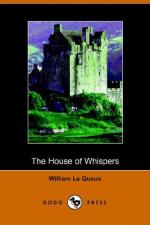“Possibly that,” Walter said. He knew the truth, but had no desire to tell even his old friend of the allegation against the girl whom he loved.
Hamilton noted the name of the village, and sat wondering at what the young barrister had just told him. It had aroused suspicions within him—strange suspicions.
They sat together for another half-hour, and before they parted arranged to lunch together at the Savoy in two days’ time.
Turning out of the Temple, Edgar Hamilton walked along the Strand to the Metropole, in Northumberland Avenue, where he was staying. His mind was full of what his friend had said—full of that curious legend of Glencardine which coincided so strangely with that of far-off Hetzendorf. The jostling crowd in the busy London thoroughfare he did not see. He was away again on the hill outside the old-fashioned Hungarian town, with the broad Danube shining in the white moonbeams. He saw the grim walls that had for centuries withstood the brunt of battle with the Turks, and from them came the whispering voice—the voice said to be that of the Evil One. The Tziganes—that brown-faced race of gipsy wanderers, the women with their bright-coloured skirts and head-dresses, and the men with the wonderful old silver filigree buttons upon their coats—–had related to him many weird stories regarding Hetzendorf and the meaning of those whispers. Yet none of their stories was so curious as that which Murie had just told him. Similar sounds were actually heard in the old castle up in the Highlands! His thoughts were wholly absorbed in that one extraordinary fact.
He went to the smoking-room of the hotel, and, obtaining a railway-guide, searched it in vain. Then, ordering from a waiter a map of England, he eagerly searched Northamptonshire and discovered the whereabouts of Woodnewton. Therefore, that night he left London for Oundle, and put up at the old-fashioned “Talbot.”
At ten o’clock on the following morning, after making a detour, he alighted from a dogcart before the little inn called the Westmorland Arms at Apethorpe, just outside the lodge-gates of Apethorpe Hall, and making excuse to the groom that he was going for a walk, he set off at a brisk pace over the little bridge and up the hill to Woodnewton.
The morning was dark and gloomy, with threatening rain, and the distance was somewhat greater than he had calculated from the map. At last, however, he came to the entrance to the long village street, with its church and its rows of low thatched cottages.
A tiny inn, called the “White Lion,” stood before him, therefore he entered, and calling for some ale, commenced to chat with the old lady who kept the place.
After the usual conventionalities about the weather, he said, “I suppose you don’t have very many strangers in Woodnewton, eh?”
“Not many, sir,” was her reply. “We see a few people from Oundle and Northampton in the summer—holiday folk. But that’s all.”




